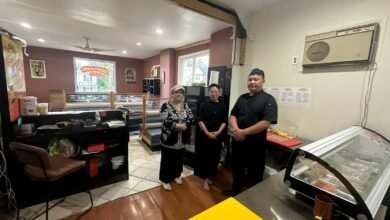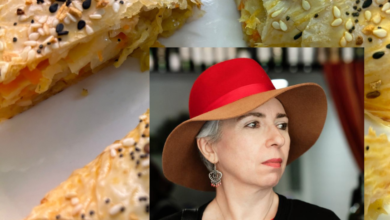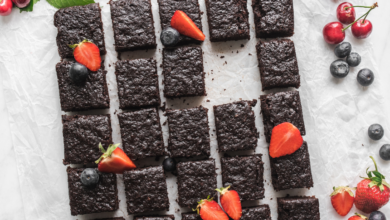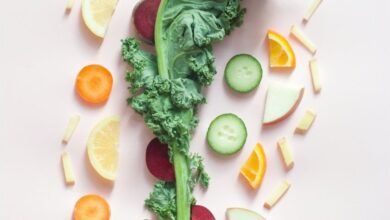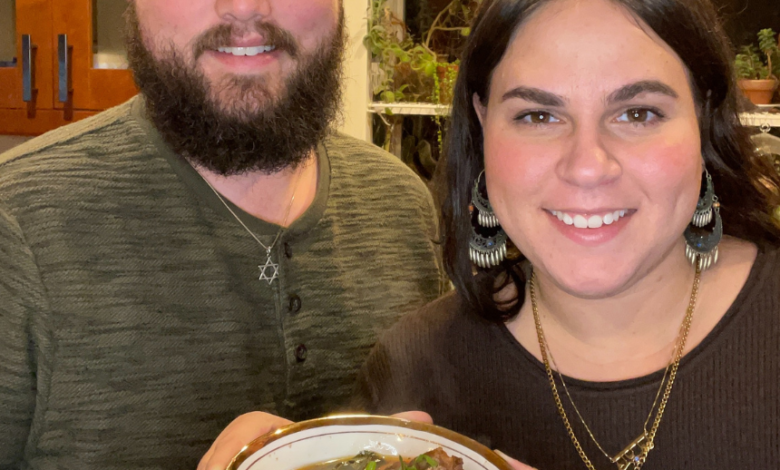
Hadassah and Akiva offer us this Shurpa. An Uzbek Lamb, Chickpea and Vegetable Soup with a rich and nourishing broth, filled with goodness from boiled bones. This stew-like soup is filled with pieces of meat fallen off the bone, fibre-rich chickpeas, a mixture of vegetables and wonderfully warm spices. Serve with fresh bread to dip.
Community Recipes is a recurring feature where we share your recipes on the Jewish Food Hero blog. If you want to share a recipe in this series, pitch us your idea here. This series is all about sharing Kosher recipes. We are creating a positive community around food and sharing.

Tell us about yourself, Akiva and Hadassah Budrevich-Ryan!
We are a Jewish couple living in Olympia, WA. We want to share Jewish food from around the world! Born in Haifa, Hadassah has a rich food history that incorporates Ashkenazi and Russian classics, Uzbek flavors, and Israeli dishes. Akiva grew up in the Northwest and was always fascinated by the food around him, filling his life with learning, cooking, and traveling around the world, including India, Turkey, Greece, and Chile.
We want to share lesser known recipes, creative techniques, and fun ideas in our cooking. We always try to highlight the history behind the food as we go.
Come and join us on Instagram, @whatsforshabbatdinner!
Do you know much about your family histories?
Hadassah’s family lived in Central Asia for a couple of generations before making the difficult journey to immigrate to Israel in the late 80s. They left Tashkent with no citizenship, one taxi voucher, a letter from an acquaintance in Technion University, and wearing their most important possessions. They later immigrated to the US, bringing their food traditions with them, from Pelmeni to Shashlik to Bourekas. Hadassah has now been a US citizen for 10 years and works as a data analyst in early education.
Akiva grew up in Washington State surrounded by some of the best Asian cuisine in the US: Vietnamese, Korean, Japanese, and Chinese. His family has always encouraged him to branch out: his aunt introduced him to potstickers at 2 years old and he has never looked back. Akiva is now a high school English teacher. He encourages his students to channel their curiosity and creativity, questioning everything around them.
We met in undergrad at Lewis & Clark College in Portland, OR and got married in both Oregon (Thunder Island), where we held a Jewish ceremony, and Washington (Skamania Lodge), where we held the reception. Having to cross the Bridge of the Gods, we bridged our love and life together. We recently bought our first home in Olympia, WA and are happily preoccupied with many house projects including developing our front garden. We love cooking Shabbat dinners, experiencing the beautiful PNW outdoors, and connecting with our community.

What do you do for fun?
Akiva is reading Ursula K LeGuin’s Earthsea series, a fantastic series of seminal fantasy from a PNW author. In his free time, Akiva likes to read, play video games, and make Kombucha. His favorite meal changes almost daily, although he’s always game for a deeply flavored sauce with some rice (ie curry).
Hadassah is more of a TV watcher. Her favorite recent show has been The Beauty Queen of Jerusalem! She loves to cuddle up with our bluetick coonhound, Ellie Mae, on the couch, go thrifting for vintage tchochkes on the weekend, and make popcorn.
Tell us about your passion project
Our passion project is our Instagram account @WhatsForShabbatDinner!
Before the pandemic, the way we used to be in community was inviting our friends over for meals. COVID-19 made this difficult, so as a way to stay connected we made our Instagram! What we didn’t expect was how far our creative boundaries would be pushed, how deep we dug emotionally in our writing, and how much support and connection we have had from within our community. It makes us happy to hear about how our posts help people learn recipes, techniques, and surprising history. It has also been a powerful point of connection with our families; we have so many avenues to explore within our families for new recipes and ideas, and beyond that we have strengthened our bonds with each other while in the kitchen, sharing our food.

Tell us about your connection with Judaism. How is it expressed in your life in general, and in your kitchen?
Hadassah has been Jewish her whole life, steeped in the deep cultural traditions that come with being Jewish. She grew up in a Moshav in Israel during the formative years of her life, and continued to maintain a connection with Judaism after moving to the US. However, with the move, she felt the pressure of assimilation, and only within the past few years has she started to de-assimilate and re-learn Judaism as an adult. With this came a renewed energy and appreciation for her family’s food.
Akiva came more recently to Judaism – while he did not grow up Jewish, his introduction to Judaism through Hadassah’s family left an indelible mark, and he began the process of converting. After years of study, preparation, and soul-searching, Akiva is now Jewish and is active within his community in Olympia, at Temple Beth Hatfiloh. A point of connection to Judaism for him always came through food and cooking, and he continues to learn and tinker, striving to achieve Bubbe levels of Jewish cooking.
How do you express your values in your home through your kitchen?
For us, food is symbolic and familial. We love that Jewish holidays always have symbolism in the food: if it’s Hanukkah, it’s fried in oil, if it’s Rosh Hashannah, it’s something round, if it’s Purim, it’s in the shape of our enemies’ ear. Even on non-Jewish holidays, we like to connect our food with the world around us through symbolism. And sharing our food is just as important. We try to share Shabbat dinners with family and friends as often as possible, often taking our ring light and knife kit on the road!

What is the best thing you learned from another person about food and hospitality?
Anthony Bourdain has always been Akiva’s guiding light in the culinary world: his willingness to try anything and his genuineness with the people he met always connected. In reflecting on his life, Bourdain’s work was always trying to see what food said about the people who make it and eat it. That’s something that sticks with us all the time; we want to reflect ourselves in our food: our values, our cares, our worries, our fears, our dreams, all of those are reflected in what we make.
What three food items could you not live without?
Salt, potatoes, and cumin.
What is your best food tip?
Instead of keeping your herbs in a bag in the produce drawer, put them in a glass of water with the cut stems submerged. Keep this in the refrigerator. This will keep your parsley, cilantro, basil, and green onions fresh for much longer.
What are your 2-3 go-to cookbooks?
Kosher Soul by Michale W. Twitty
The book blurb says it all! In this book, Michael Twitty “explores the cultural crossroads of Jewish and African diaspora cuisine and issues of memory, identity, and food…To Twitty, the creation of African-Jewish cooking is a conversation of migrations and a dialogue of diasporas offering a rich background for inventive recipes and the people who create them.
Sababa: Fresh, Sunny Flavors From My Israeli Kitchen: A Cookbook by Adeena Sussman
This book shares 125 recipes from and inspired by Israel and the amazing ingredients available there. Recipes include dishes like:
- Freekeh and Roasted Grape Salad
- Crudo with Cherries and Squeezed Tomatoes
- Schug Marinated Lamb Chops
- Tahini Caramel Tart
VanChef on Youtube
And, we know it’s cheating to say a YouTube channel rather than a cookbook, but we learn so many good Indian recipes from VahChef on Youtube.
Tell us the story of your Uzbek Lamb, Chickpea and Vegetable Soup (Shurpa) Recipe
This recipe comes from Hadassah’s family, who lived in Tashkent, Uzbekistan for two generations and picked up a lot of the food traditions of Central Asia while there. Shurpa is a popular Uzbek soup with many variations: it can be made with beef or lamb, whole bones, meatballs, or chunks of meat. You can use all sorts of different vegetables and different processes.
The constant ingredients are:
- a meat broth that has been simmered for hours
- a lot of cumin
- Chickpeas
Hadassah’s grandfather, Evgeny, made a clear, simple version for us when we visited them in Israel. It was our first meal after a long day of travel, and even at 3 am we were so appreciative of the care he put into the soup and how refreshing it was.
Hadassah’s mom, Elina, makes a fried version with meatballs that we had upon returning from Israel and recovering from jetlag; equally delicious and very hearty.
This version is adapted from Elina’s standard recipe with a lot of fresh veggies, just without the meatballs. Feel free to make Shurpa however you want! We served it with belyashi, a Tatar meat filled savory donut, but you can have it on its own or with a nice piece of bread.
-
½ lb dried chickpeas, soaked overnight and rinsed and drained
-
2 lbs beef or lamb meat with bones (short ribs, oxtail, ribs, leg – any cut that has both bones and meat
-
2 tablespoons vegetable oil
-
1 large onion, sliced
-
2 ½ quarts water
-
2 carrots, cut in ½ inch chunks
-
1 tablespoon cumin seeds, crushed in your hand
-
2 Yukon gold potatoes, quartered
-
2 bell peppers, cut in inch chunks
-
1 tablespoon coriander powder
-
¼ tablespoon chili powder
-
2 tomatoes, cut in quarters
-
Basil sprig
-
Chopped green onions and cilantro for garnish
-
The night before, soak the chickpeas in a bowl with plenty of cold water. They will double in size.
-
Fry the bones and meat in oil over medium high heat until well browned. Remove and add onions, fry until just soft, then add bones back along with 2 ½ quarts of water.
-
Bring to a boil and skim the scum as it heats up. Add the carrots, black pepper, cumin seeds, and a bit of salt, reduce to simmer, and let it go for 1-2 hours.
-
Add the potatoes, bell peppers, coriander, chili powder, basil sprig, tomatoes, and drained and rinsed chickpeas. Continue to simmer for 30 minutes.
-
Taste and adjust seasoning. Serve garnished with chopped herbs.
Keywords: Uzbek, Shurpa, spiced soup
More Community Recipes
Jewish Food Hero’s Community Recipes feature is a space for us all to share our favorites and hear from a variety of people in our community. This is an easy and fun way to get new meal ideas and learn about each other. Since you’ve read Hadassah and Akiva’s recipe, do you feel inspired to share your Kosher recipe? Don’t forget to get in touch to share your recipe too!
Check out these other recipes from our community:

